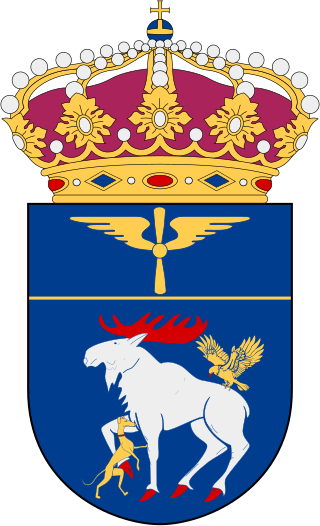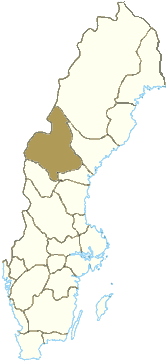
Jämtland County is a county or län in the middle of Sweden consisting of the provinces of Jämtland and Härjedalen, along with minor parts of Hälsingland and Ångermanland, plus two small uninhabited strips of Lapland and Dalarna. Jämtland County constitutes 12 percent of Sweden's total area, 49,443 km2 (19,090 sq mi) and is the third largest county in the country. The county capital is Östersund and the county governor, appointed by the Swedish government, is Jöran Hägglund, who leads the administrative board. Jämtland County borders the counties of Dalarna, Gävleborg, Västernorrland, and Västerbotten. It also shares a border with the Norwegian county of Trøndelag.

Jämtland is a historical province in the centre of Sweden in northern Europe. It borders Härjedalen and Medelpad to the south, Ångermanland to the east, Lapland to the north and Trøndelag and Norway to the west. Jämtland covers an area of 34,009 square kilometres, 8.3% of Sweden's total area and is the second largest province in Sweden. It has a population of 115,331, the majority of whom live in Storsjöbygden, the area surrounding lake Storsjön. Östersund is Jämtland's only city and is the 24th most populous city in Sweden. The historical province is one of the least densely populated.

Franz Adolf Berwald was a Swedish Romantic composer and violinist. He made his living as an orthopedist and later as the manager of a saw mill and glass factory, and became more appreciated as a composer after his death than he had been in his lifetime.

Kurt Magnus Atterberg was a Swedish composer and engineer. He is best known for his symphonies, operas, and ballets.

In Swedish folklore, the Storsjöodjuret is a lake monster said to live in the 90-metre-deep (300 ft) lake Storsjön in Jämtland in the middle of Sweden.

Östersund is an urban area (city) in Jämtland in the middle of Sweden. It is the seat of Östersund Municipality and the capital of Jämtland County. Östersund is located at the shores of Sweden's fifth-largest lake, Storsjön, opposite the island Frösön. It is the only city in Jämtland. The northern part of the urban area is located inside of the municipality of Krokom.

Pehr Wilhelm Wargentin, Swedish astronomer and demographer.

Olof Wilhelm Peterson-Berger was a Swedish composer and music critic. As a composer, his main musical influences were Grieg, August Söderman and Wagner as well as Swedish folk idiom.

Frösön, is the largest island in the lake Storsjön, located west of the city Östersund in Jämtland, Sweden. During most of recorded history Frösön was the regional centre of Jämtland, and it is the location of the Frösö Runestone, the northernmost in the world.
The Conquest of Jemtland refers to the Norwegian (re-)conquest of the province of Jämtland in the summer of 1677 during the Scanian War. The conquest was short-lived; Sweden was able to regain control of the province in November the same year.

Per Gunnar Fredrik de Frumerie was a Swedish composer and pianist. He was the son of architect Gustaf de Frumerie and Maria Helleday.

Jämtland Wing, also F 4 Frösön, or simply F 4, is a former Swedish Air Force wing with the main base located at Åre Östersund Airport outside Östersund on Frösön in the middle of Sweden.

Jämtland is a large land-locked Swedish province in the heart of the Scandinavian peninsula in northern Europe. Jämtland covers an area of 34,009 square kilometres, 8.3 per cent of Sweden's total area and is the second largest province in Sweden.
The history of Jämtland dates back thousands of years, starting with the arrival of humans. During the middle ages, Jämtland was an autonomous peasant republic, with its own law, currency and parliament. Jämtland was conquered by Norway in 1178 and stayed Norwegian for over 450 years, maintaining some autonomy until it was ceded to Sweden in 1645. The province has since been Swedish for roughly 350 years, though the population did not gain Swedish citizenship until 1699.
The Doomsday Prophets is an opera by Wilhelm Peterson-Berger, to his own Swedish libretto, composed from 1912–17. It was first performed at the Royal Opera, Stockholm on 21 February 1919.

Karin Branzell was a Swedish operatic contralto, who had a prominent career at the Metropolitan Opera, New York, and in Europe. Her very wide range enabled her to sing both contralto roles and the occasional soprano role. She was particularly noted for her singing of the music of Richard Wagner, in roles such as Ortrud (Lohengrin), Venus (Tannhäuser), Erda, Brangäne, and Brunnhilde. She was considered on a par with Margarete Klose and Kerstin Thorborg as a Wagnerian contralto. Amneris (Aida), Dalila, Herodias (Salome), and Clytemnestra (Elektra) were among her other renowned roles.

Hoverberget is a mountain on a peninsula in the southern part of the Storsjön lake. The mountain, a significant landmark and a Natura 2000 designated nature reserve, lies within Berg Municipality in the southern parts of Jämtland in northern Sweden. The village of Berg lies on the south slope of the Hoverberget, which is 255 m (837 ft) above the Storsjön and the surrounding area, and culminates at 548 m (1,798 ft) above sea level.
Gillet pa Solhaug is an 1893 Swedish-language opera in 3 acts by Wilhelm Stenhammar to a libretto based on The Feast at Solhaug by Henrik Ibsen. The opera was completed in 1893, and premiered at the Hoftheater Stuttgart in 1899, then in Sweden at the Royal Swedish Opera in 1902.

Ran is a 1903 Swedish-language opera in three acts by Wilhelm Peterson-Berger. Titled after the sea goddess Ran, the subject and Wagnerian influence precedes his better known opera on Nordic legend Arnljot. Successful in its day, the piano reduction of "Danslek" is the only excerpt remembered today.
Klas Gustaf Henrik Karlsson is a Swedish musicologist and author.

















